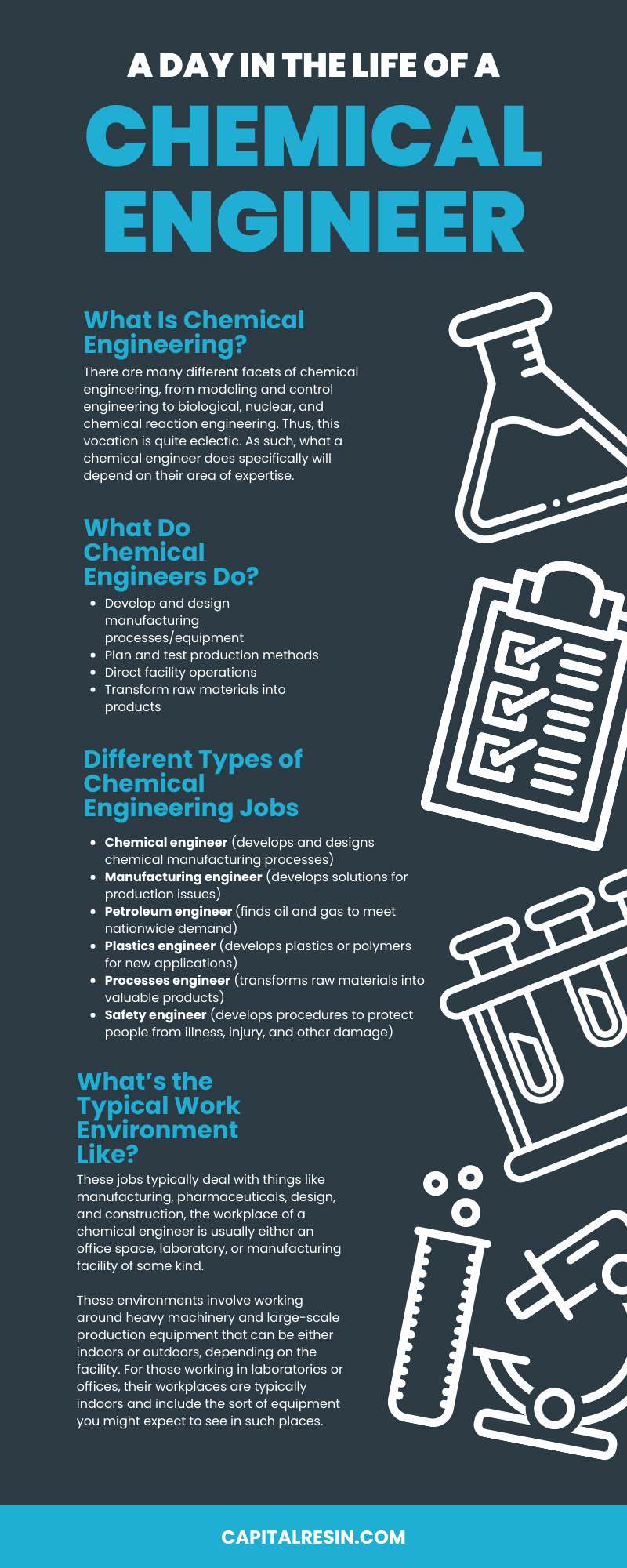Chemical engineering provides everything from food additives to revolutionary pharmaceuticals and innovative healthcare and manufacturing processes. Behind the scenes of this incredible vocation are the chemical engineers who make it happen.
So, what exactly does their daily workday look like? Moreover, how are chemical engineers positioned to provide society with so many necessary products, procedures, and processes? Those are all excellent questions, and we intend to answer them in this comprehensive guide.
What Is Chemical Engineering?
To walk you through a day in the life of a chemical engineer, it’s imperative to understand what chemical engineering entails. In the most basic terms, chemical engineering is an innovative, multidisciplinary engineering sect. It spans a wide array of different industries, jobs, and processes.
There are many different facets of chemical engineering, from modeling and control engineering to biological, nuclear, and chemical reaction engineering. Thus, this vocation is quite eclectic. As such, what a chemical engineer does specifically will depend on their area of expertise.
What Do Chemical Engineers Do?
To fully understand what chemical engineers do, we need to reach through the lens and learn about how they can produce products and perform various tasks in the first place.
In general, chemical engineers draw on their knowledge and expertise in various fields to transform raw materials into a diverse range of products. Moreover, most chemical engineering also requires engineers to:
- Develop and design manufacturing processes/equipment
- Plan and test production methods
- Direct facility operations
- Transform raw materials into products
Further, these engineering roles typically focus on plant design and operations, risk and safety assessments, and product development, among other things.
Thus, if you’re wondering what a day in the life of a chemical engineer is like, you can be confident that it looks a bit different for each professional. Moreover, it ranges depending on the specialty each engineer chooses to focus on.
Different Types of Chemical Engineering Jobs
We know what you’re thinking—how exactly can one vocation be responsible for so many different responsibilities? It’s an understandable query to have. But it’s easier to wrap your head around if you imagine chemical engineering as a giant umbrella.
Underneath that umbrella lies four major categories:
- Research and development
- Design
- Commissioning
- Operations
Within these categories are many related roles, each with its unique duties and responsibilities. Thus, in chemical engineering, official job titles could be any of the following:
- Chemical engineer (develops and designs chemical manufacturing processes)
- Manufacturing engineer (develops solutions for production issues)
- Petroleum engineer (finds oil and gas to meet nationwide demand)
- Plastics engineer (develops plastics or polymers for new applications)
- Processes engineer (transforms raw materials into valuable products)
- Safety engineer (develops procedures to protect people from illness, injury, and other damage)
As you can see, there are various directions to go in pursuit of chemical engineering. However, all the roles listed above involve working with different processes that keep the sector efficient, effective, and safe.
The Standard Responsibilities
As we’ve seen, there’s a wide range of different jobs and daily responsibilities, depending on which corner of chemical engineering one works within. There are a few general things that every discipline in chemical engineering does in some regard.
Chemical research and development are—of course—a significant part of any chemical engineer’s duties. After all, trailblazing new designs, manufacturing processes, and products require understanding how the materials being used relate to the work being done. Of course, along with that, chemical engineers might also be responsible for:
- Liaising with process chemists and control engineers to help process plants run efficiently.
- Troubleshooting issues with current manufacturing processes and developing solutions.
- Supervising the design, installation, and commissioning of new production facilities.
- Ensuring safe workplace conditions and compliance with health and safety requirements.
- Estimating production costs for facility management.
What’s the Typical Work Environment Like?
Hopefully, you’re beginning to understand the type of things chemical engineers do daily. But perhaps just as paramount to that knowledge is understanding their workplace environments. Again, this will largely depend on the type of work a particular engineer does.
That said, because these jobs typically deal with things like manufacturing, pharmaceuticals, design, and construction, the workplace of a chemical engineer is usually either an office space, laboratory, or manufacturing facility of some kind.
These environments involve working around heavy machinery and large-scale production equipment that can be either indoors or outdoors, depending on the facility. For those working in laboratories or offices, their workplaces are typically indoors and include the sort of equipment you might expect to see in such places.
As you can imagine, all chemical engineering work environments have to be state-of-the-art for efficiency, safety, and organization for daily duties to be fulfilled.
How Does One Become a Chemical Engineer?
In short, chemical engineering is a diverse sector teeming with opportunities for those who choose it. And hopefully, we’ve shed light on what this type of vocation has in store for industry professionals daily.
Even with all of that information, you’re probably still wondering how one becomes a chemical engineer in the first place. Luckily, we’ve got some valuable insight on that, too.
Qualifications and Requirements
When you’re looking to pursue a career in chemical engineering, there are specific qualifications and requirements that your potential employers will be looking for. For this reason, entry-level positions will require a graduate or postgraduate degree in chemical engineering (or related field) at least. Relevant course programs include:
- Biochemistry
- Chemical engineering
- Chemistry
- Physics
- Mathematics
- Software engineering
As we’ve learned, chemical engineering is a vast field. So those interested in it should contemplate what they’d like to specialize in as they choose their degree paths.
Necessary Skills and Experience
Of course, like any other profession, as you move up the ladder of chemical engineering, you’ll need to have a particular set of skills and experience to compete with other candidates applying for the same roles. For mid to senior-level positions, your prospective employers will likely require you to have the following things on your resume:
- Firm understanding of engineering mathematics and principles
- Problem-solving and analytical skills
- Advanced critical thinking skills
- Applicable industry knowledge
- Business and commercial awareness
These skills are integral to fulfilling your daily duties as a chemical engineer, regardless of the specialty you pursue. Thus, it’s crucial to understand and fine-tune these skills to navigate your career path. And hopefully, our comprehensive look into the daily life of chemical engineers has helped you learn something new and possibly convinced you to pursue a career in this incredible sector for yourself.








